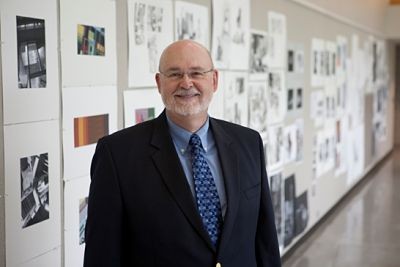CLAS dean named executive director of RSA

Frederick Antczak, dean of Grand Valley State University’s College of Liberal Arts and Sciences, has been named Rhetoric Society of America’s executive director.
Aug 11, 2011
Nestled into Fred Antczak’s top shelf, among dozens of books on Martin Luther King Jr., sits a plaque signifying his 2001-2002 term as president of the Rhetoric Society of America, sleeping proudly on top of his book, “Thought and Character: The Rhetoric of Democratic Education.”
Now, nearly 10 years later, Grand Valley State University’s dean of the College of Liberal Arts and Sciences, has been named the new executive director of the RSA and will begin his appointment during the summer of 2012, serving a renewable four-year term.
“It’s interesting work because it allows other people to accomplish what they want in a way that they might not be able to manage by themselves,” Antczak said. “That’s why people come together to do things that they can’t do alone.”
The RSA is an interdisciplinary scholarly organization geared at faculty ranging from English and communications to economics and history who take a rhetorical approach to scholarship to provide them with conferences and workshops that build up their writing as well as provide grants and monetary support at times to allow them to continue in their area of research.
“Interdisciplinary scholars often are sort of marginalized within their own discipline – in English or in communication – and what this organization does is bridge that and give you a place to stand,” Antczak said.
Antczak, who became a member of the RSA back in the 90s, helped to double the then-dwindling membership of the group during his run as president.
“I was lucky enough to be president during a real time of transition where it was possible to do some change within the organization,” he said. “Because of that success I’ve remained in touch with them and done projects for them.”
The role of the executive director, he said, is not so much one of policy as it is one of management; making conference arrangements, balancing finances, paying taxes and over all monitoring of organizational activity.
His first order of business in his new position will be putting the finances in order and making sure existing contracts are good and sustainable – as he said, “checking up on the business end of the organization.”
He said his new role as the RSA’s executive director will not only allow him to use his experience in the world of higher education to benefit the RSA, but the exposure within the organization to other groups will allow him to be a “little bit more of a foresighted dean.”
“Because RSA is part of the American Council of Learned Societies, I’m going to use this as an opportunity both for RSA and for Grand Valley to find out how learned societies in other disciplines like biology, history and all of the ones that are working the United States right now – how they do their business, what they’re prioritizing, what they are putting money into,” Antczak said. “If I can see trends in the liberal arts, that will help me support my faculty here. And if I can see trends in the way societies are managed, then I can help the RSA.”
During his time in the RSA, Antczak has done research on Abraham Lincoln as well as Martin Luther King Jr. in addition to his extensive research in the general ethics of rhetoric.
“I guess a thread that holds those together is this: we’re a society that is open and liberal in the classical sense but there are some bottom line values without which we could not keep ourselves open,” he said. “Both for Lincoln in his views of slavery and King’s in his views of voting rights, I thought they were about articulating what aspects of that fundamental American ethic is all about. “
Antczak is bringing that fundamental ethic to his view of the workplace as well, most excited for fulfilling his obligation to the younger rhetorical scholars and hoping to help inspire a “trampoline effect” that may help launch them into success in their own careers.
“I think that professors, as they get older, get an obligation to help people laterally as well as vertically,” he said. “In other words, we spend our whole lives helping students but at some point or another you develop a kind of leadership obligation to help younger people in your profession. Either way, it’s a manifestation of helping people that you don’t know and I don’t know, it feels generous, it makes you generous if you keep fulfilling that obligation.”

























